Most Advanced Treatment of Atrial fibrillation, Irregular Heart beat & Arrhythmia by Radiofrequency Ablation at World Class Hospitals in India.
Benefits of Interventional Cardiology
Get Free Expert Medical Advice/ Second Opinion from Top Heart Specialists by Email, WhatsApp or Viber.
Why you should choose India for Affordable, World Class Heart Surgery, Cardiac Care ?



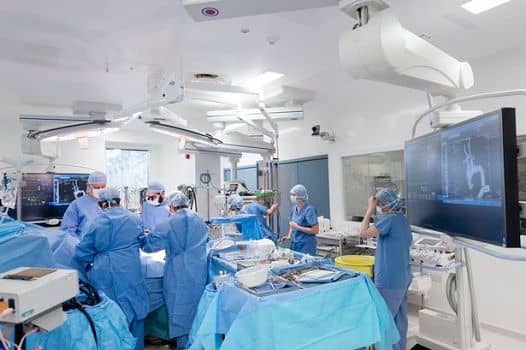
Radiofrequency Catheter Ablation Treatment
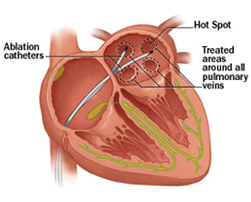
How does the heart normally work? : Heart muscle cells are stimulated by electrical impulses that cause them to contract in a uniform way and with a regular rate. This contraction produces the heartbeat, which causes blood to be pumped out of the heart into arteries and then to all parts of the body. The flow of blood into arteries can be measured by feeling the pulse, which corresponds to the heartbeat.
Sometimes, the electrical impulses “short circuit” the normal pathway and travel across the heart in an abnormal way. Abnormal pathways, or routes, for the impulses can develop, causing irregularities in the heartbeat, or arrhythmias. In other cases, arrhythmias arise when areas other than the sinus node become active and begin to send out impulses that either compete with or take over the pacemaker function of the sinus node. Typically, the result of these abnormalities is a heartbeat that is too fast. This may develop in any location within the atria, AV node, or ventricles. When the fast rhythm requires tissue from the upper part of the heart, it is known as supraventricular tachycardia. When it requires tissue from the lower chambers only, it is known as ventricular tachycardia.Get Estimate
Benefits of Radiofrequency Catheter Ablation
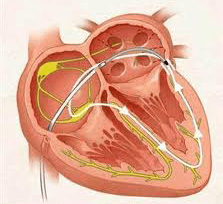
- It takes much less time to recover from RFA than it does from conventional surgery.
- Radiofrequency ablation is less expensive than other treatment options.
- No surgical incision is needed—only a small nick in the skin that does not have to be stitched to close it.Get Estimate
What is Radiofrequency Catheter Ablation?
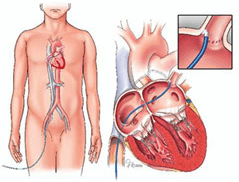
The damaged tissue is no longer capable of generating or conducting electrical impulses. If the procedure is successful, this prevents the arrhythmia from being generated, curing the patient. An important advantage of RF current is that it does not directly stimulate nerves or heart muscle and can therefore often be used without the need for general anesthesia. RFA has become increasingly accepted in the last 15 years with promising results. RFA procedures are performed under image guidance (such as X-ray screening, CT scan or ultrasound) by an interventional radiologist or a cardiac electrophysiologist, a subspecialty of cardiologists.Get Estimate
Use of Radiofrequency Catheter Ablation in Cardiology
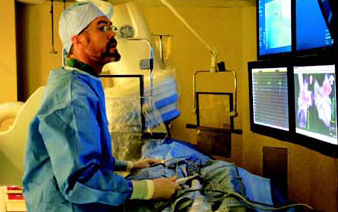
It is most often used to treat supraventricular tachyarrhythmia which are rapid, uncoordinated heartbeats starting in the heart`s upper chambers (atria) or middle region (AV node or the very beginning portion of the heart`s electrical system).
In cardiology, RF ablation is used to correct:
- Recurrent atrial flutter.
- Atrial fibrillation (AF).
- Supraventricular tachycardia (SVT).
- Some types of ventricular arrhythmia.Get Estimate

 Click to WhatsApp
Click to WhatsApp +91-9899993637
+91-9899993637












 Get Expert Medical Opinion/ Second Opinion – Send us the Medical reports by Email or WhatsApp and we will get you Expert Advice and Treatment Cost Estimates from Top Specialist at Three of India’s leading hospitals within 48 hours.
Get Expert Medical Opinion/ Second Opinion – Send us the Medical reports by Email or WhatsApp and we will get you Expert Advice and Treatment Cost Estimates from Top Specialist at Three of India’s leading hospitals within 48 hours. Free Concierge Services – Once you decide to come to India, We will arrange Priority Scheduling of Hospital Appointments, Travel & Visa Assistance, Airport Pick up, Economical Hotel Stay, Complete Local Support 24X7.
Free Concierge Services – Once you decide to come to India, We will arrange Priority Scheduling of Hospital Appointments, Travel & Visa Assistance, Airport Pick up, Economical Hotel Stay, Complete Local Support 24X7.


